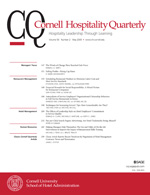Is Workplace Conflict Good or Bad?
Editor’s note: We are pleased to welcome Alice H. Y. Hon of The Hong Kong Polytechnic University, whose article “The Effects of Group Conflict and Work Stress on Employee Performance,” co-authored by Wilco W. Chan of The Hong Kong Polytechnic University, is forthcoming in Cornell Hospitality Quarterly and now available in the journal’s OnlineFirst section.
In the contemporary business world, teamwork is increasingly important because many organizations feel the need to coordinate their activities more effectively; however, there are considerable challenges to working effectively in teams. One major challenge is conflict, which is the process resulting from stress and tension between team members that arise from the complexity of task relationships, excessive work demands, interpersonal disputes, and the interdependence of organizational life (De Dreu & Weingart, 2003). Early organizational conflict theorists suggested that conflict is detrimental to team effectiveness and organizational functioning (Glazer & Beehr, 2005; Hamilton, Hoffman, Broman, & Rauma, 1993). More recently, researchers have theorized that conflict is beneficial under certain circumstances, and if people perceive the nature of conflict and manage it appropriately (De Dreu & Van de Vliert, 1997; Simons & Peterson, 2000).
Although the concepts of team conflict and work stress remain popular today, theories that account for the distinction have not been clearly developed. The present study aims to contribute to the existing literature, and argues that understanding whether the conflict is task-related or relationship-related and whether the work stress is challenge-related or hindrance-related is necessary to evaluate the influence of team conflict and work stress on employee performance. Only by clearly distinguishing these relationships can we provide comprehensive theoretical and practical human resource suggestions to both scholars and managers. We can then confidently assert that conflict associated with certain stressors may result in negative outcomes, whereas conflict associated with other stressors may result in positive outcomes.
Click here to read “The Effects of Group Conflict and Work Stress on Employee Performance” in Cornell Hospitality Quarterly.
Alice H. Y. Hon is an assistant professor at the School of Hotel and Tourism Management, The Hong Kong Polytechnic University. Her research focuses on employee creativity and innovation, intrinsic motivations, leadership, justice and trust, management team, and multilevel issues in service organizations.

























































































It’s truly a great and helpful piece of info. I am glad that you just shared this helpful information with us. Please keep us up to date like this. Thank you for sharing.